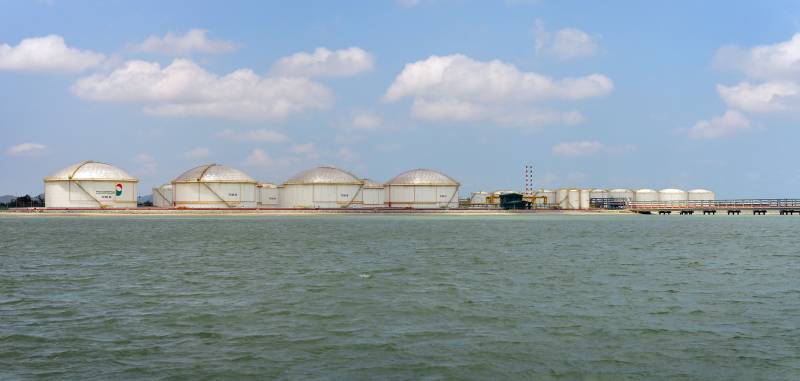SINGAPORE : Oil prices climbed in Asia Thursday, holding above $45 a barrel
following a fall in US crude production, but concerns over excess global supplies and soft demand continued to cap gains. Official numbers showed China’s manufacturing sector shrank for a second straight month in September, highlighting the challenges facing the world’s second-largest economy. In the United States, a closely-watched report seen as a gauge for oil demand in the world’s biggest economy showed that commercial crude inventories rose by four million barrels to 457.9m barrels in the week ending Sept 25.
That was about 28 percent higher than a year ago, keeping inventories at a level not seen in at least 80 years for this time of year, said the US Department of Energy report.
A build-up in commercial inventories indicates softer demand.
But the report also showed US crude production falling by 40,000 barrels per day to 9.096 million barrels per day (bpd), which is positive news for the oversupplied global market.
Meanwhile, output from the OPEC group of oil exporters stood at 32 million bpd in September, down from previous month but still above its quota, Bloomberg News said.
In afternoon Asian trade, US benchmark West Texas Intermediate (WTI) for November delivery was up 60 cents to $45.69 and Brent crude for November added 43 cents to $48.80 a barrel.
“Oil prices remain stuck within the month-long consolidation range, with WTI trapped within $40-50, and Brent within $45-55,” said Bernard Aw, market strategist at IG Markets in Singapore.
“Mixed signals probably act as a two-way force on crude prices, as US production continues to decline while OPEC produced above its 30 million a day quota for the 16th month in September.” Aw said traders will also be digesting the implications of the official manufacturing data from China which was released Thursday.
“Given how sensitive the global markets are to all things out from China, these manufacturing numbers will be closely watched, and should continue to reinforce the slowing China narrative,” he said.
Friday, April 19, 2024
Oil prices advance in Asia

Formula 1 returns to China for Round 5
9:05 PM | April 19, 2024
Germany head coach Julian Nagelsmann extends contract till 2026 World Cup
9:00 PM | April 19, 2024
IMF urges Italy, France to spend less, Germany to loosen purse strings
8:57 PM | April 19, 2024
PM calls UAE president, admires Emirati leadership's response to recent Dubai rains
8:55 PM | April 19, 2024
Church leader calls for including Christians in Gandhara Corridor
8:50 PM | April 19, 2024
A Tense Neighbourhood
April 19, 2024
Dubai Underwater
April 19, 2024
X Debate Continues
April 19, 2024
Hepatitis Challenge
April 18, 2024
IMF Predictions
April 18, 2024
Kite tragedy
April 19, 2024
Discipline dilemma
April 19, 2024
Urgent plea
April 19, 2024
Justice denied
April 18, 2024
AI dilemmas unveiled
April 18, 2024
ePaper - Nawaiwaqt
Advertisement
Nawaiwaqt Group | Copyright © 2024





